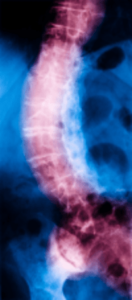Understanding Spinal Deformities

Some medical conditions can be serious in nature yet show no visible signs of their presence. However, a spinal deformity often brings on substantial physical complications. In many cases, it is the visible warning signs that alert sufferers and their families to a problem. By better understanding why spinal deformities develop and how they typically present, individuals can seek the help they need should they suspect that they or a loved one has such a condition.
Types of Spinal Deformities
Scoliosis is an extremely common spinal deformity. Those with it have, to varying degrees, a side-to-side curvature of the spine. Though mild cases of scoliosis may only be visible when the patient removes his clothing, more severe forms of the disease can be readily apparent to others. As the condition progresses, individuals who have it may suffer from uneven shoulders or hips. Under some circumstances, one side of the ribcage may jut out farther from the body. Kyphosis, another type of spinal deformity, can also distort the upper body. This condition develops when the spine has a curvature that causes a humped back.
Causes of Spinal Deformities
The most current research indicates that spinal deformities may run in families. In some cases, the vertebrae may suffer congenital problems that later evolve into either scoliosis or kyphosis. Beyond these causes, though, the reasons why spinal deformities occur are widely unknown.
Treatment for Spinal Deformities
Because both scoliosis and kyphosis tend to exhibit visible warning signs, sufferers and their loved ones should not ignore unusual back curvature or body alignment issues. The longer that either problem persists without treatment, the more difficult it can be to address it. Because many instances of scoliosis and kyphosis are mild in nature, doctors may recommend only professional supervision of the condition. If the problem does not increase in severity, no further treatment may be given. Should scoliosis or kyphosis cause a significant curvature of the spine, brace treatment or surgical intervention may be necessary.
The Spine Institute of Nevada can help you overcome your spinal problems. Our staff of capable and experienced spine experts, headed by Dr. Perry, offers personalized treatment that caters to your specific needs. Call us today at 702-239-3787 to schedule an appointment at our Las Vegas office.
